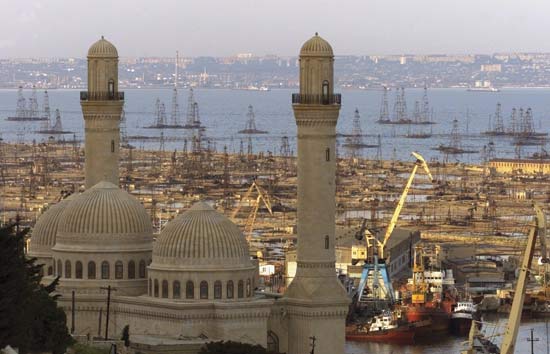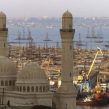Interfaith Respect and Dialogue in Azerbaijan
By:

Featuring:
Ambassador Elshad Iskandarov
Chairman of the State Committee of the Republic of Azerbaijan for Religious Associations
Comments by: Vladimir Socor
Senior Fellow, The Jamestown Foundation
Moderator: Margarita Assenova
Director of Balkans, Caucasus & Central Asia Programs,
The Jamestown Foundation
Wednesday, December 5, 2012
3:00 P.M.–4:30 P.M.
The Jamestown Foundation
7th Floor Conference Room
1111 Sixteenth Street, N.W.
Washington, D.C. 20036
On December 5, The Jamestown Foundation hosted a roundtable discussion with Ambassador Elshad Iskandarov, Chairman of the State Committee on Religious Associations of Azerbaijan, and featuring remarks by Jamestown Senior Fellow Vladimir Socor. Ambassador Iskandarov came to Jamestown to discuss the peaceful co-existence and mutual respect of different religious groups in Azerbaijan, including the majority Shi’a and minority Sunni Muslims as well as adherents to various Christian denominations. Ambassador Iskandarov also talked about the division between secular and religious authority in the country and Baku’s interaction with its neighbors and international organizations within the sphere of religious policy.
Mr. Socor opened the discussion by noting that religion in the South Caucasus is political in nature and an important aspect of national identity throughout the world. Yet, he also observed, religion can too easily be exploited by extremist groups seeking their own political ends. Socor further commented on Azerbaijan’s broader role within the Euro-Atlantic space. He argued that Azerbaijan had chosen a Western orientation for itself, which is reflected in the country’s energy exports to the West. It is also a key link in the Northern Distribution Network, and will serve an increasingly important role in this regard as a transit corridor for NATO supplies being pulled out of Afghanistan after 2014. Socor also pointed out that by purchasing Boeing 787 aircraft and an advanced satellite transmission network from a Virginia-based company, Azerbaijan directly supports 1,000s of American jobs. Yet, as Socor asserted, Baku’s strategic relationship with Washington has, to date, been largely one-sided, with nearly all of the partnership’s deliverables coming from Azerbaijan. Socor concluded by noting that the South Caucasus in general, and Azerbaijan in particular, are a link between Europe and Asia as well as between the Christianity and Islam, thus necessitating a robust Western engagement with this area of the world.
Ambassador Iskandarov described Azerbaijan’s tradition of tolerance and interfaith dialogue, which is “home grown” and a long-time feature of the country’s culture. As he noted, tolerance and inter-religious dialogue has historical roots that predate Azerbaijan’s statehood traditions. The Ambassador argued that religious pluralism in Azerbaijan is a consequence of the country’s location at the geographic crossroads of several continents and multiple peoples and ethnicities. He pointed out that the “Mother of all Churches in the South Caucasus,” located in northern Azerbaijan, is sacred to Azerbaijani Christians but also highly regarded by the country’s Muslims. He further described the rich history of acceptance of adherents of the Jewish faith in Azerbaijani society. As Ambassador Iskandarov explained, Azerbaijan’s policy toward religions is to “do no harm” and to treat all faiths equitably while maintaining the state’s distance from any one particular religion. In that sense, he asserted, Azerbaijan is more secular than the other countries of the South Caucasus. The Ambassador also commented on the 2009 amendments to Azerbaijan’s law on religion, which has significantly heightened scrutiny for the registration of religions in the country, stemming from a sudden appearance of religious extremism in Azerbaijan. However, as he noted, the new amendments have also made it nearly impossible for the state to unilaterally liquidate any particular religion’s right to exist on Azerbaijan’s territory once it is registered and recognized. Ambassador Iskandarov stressed in his presentation that democratization in any country must be home grown, and religious tolerance is an important precondition for such a process. He argued that it is in Washington’s interest to support and promote Azerbaijan’s model of tolerance and inter-religious dialogue because its presence in a Muslim-majority country will have a greater chance of also being accepted in the rest of the Muslim world. The Ambassador concluded that Azerbaijan’s approach to religion is more relevant and more successful than a secularist model that lacks religious dialogue and tolerance.
Bios
Ambassador Elshad Iskandarov
Since May 2012, Ambassador Elshad Iskandarov has served as the chairman of the State Committee of the Republic of Azerbaijan for Religious Associations. Prior to this, between 2005 and 2012, he was secretary general of the Islamic Conference Youth Forum for Dialogue and Cooperation, an international institution affiliated with the Organization of the Islamic Conference (OIC). Between 1999 and 2000, he worked at the Azerbaijani Foreign Ministry in the Department of International Organizations. And in 2000, Ambassador Iskandarov was appointed First Secretary at the Permanent Mission of the Republic of Azerbaijan to the United Nations, a position he held until 2005. Ambassador Iskandarov also has many years of experience working with youth groups in Azerbaijan. In 1996–1998, he was a board member of the National Assembly of Youth Organizations of Azerbaijan (NAYORA), and between 1998 and 1999, he served as this organization’s vice president for international relations. Ambassador Iskandarov holds Master’s degrees from Baku State University as well as Columbia University in New York City.
Vladimir Socor
Vladimir Socor is a Senior Fellow of the Washington-based Jamestown Foundation and its flagship publication, Eurasia Daily Monitor (1995 to present), where he writes analytical articles on a daily basis. An internationally recognized expert on former Soviet-ruled countries in Eastern Europe, the South Caucasus, and Central Asia, he covers Russian and Western policies there, focusing on energy policies, regional security issues, secessionist conflicts, and NATO policies and programs.
Mr. Socor is a frequent speaker at U.S. and European policy conferences and think-tank institutions. He is a regular guest lecturer at the NATO Defense College and at Harvard University’s National Security Program’s Black Sea Program (Kennedy School of Government). He is also a frequent contributor to edited volumes. Mr. Socor was previously an analyst with the Radio Free Europe/Radio Liberty Research Institute (1983–1994). He is a Romanian-born citizen of the United States based in Munich, Germany.




